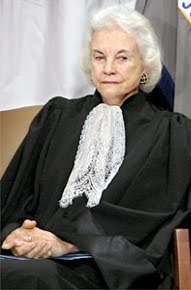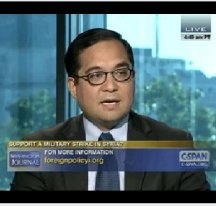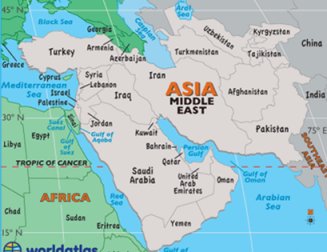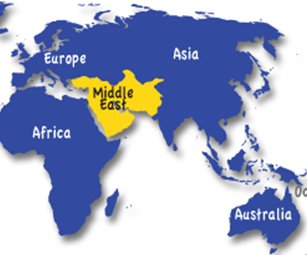America is working
with governments and reformers throughout the Middle East.
We are strengthening ties through our
Middle
East partnership initiative. As a further step,
Secretary Powell and Trade Representative Zoellick will meet
with regional leaders in Jordan next month to discuss an
agenda of economic and political and social progress.
Progress will require increased trade, the engine of
economic development.
The combined GDP of all Arab
countries is smaller than that of Spain. Their peoples have
less access to the Internet than the people of Sub-Sahara
Africa. The Arab world has a great cultural tradition, but
is largely missing out on the economic progress of our time.
Across the globe, free markets and trade have helped defeat
poverty, and taught men and women the habits of liberty. So
I propose the
establishment of a U.S. -Middle East free trade area
within a decade, to bring the Middle East into an expanding
circle of opportunity, to provide hope for the people who
live in that region.
We will work with our partners to
ensure that small and mid-sized businesses have access to
capital, and
support efforts in the region to develop central laws on
property rights and good business practices. By
replacing corruption and self-dealing, with free markets and
fair laws, the people of the Middle East will grow in
prosperity and freedom.
...
And,
ultimately, both economic success and human
dignity depend on the rule of law and honest
administration of justice. So America will
sponsor, with the government of Bahrain, a
regional forum to discuss judicial reforms.
And I'm pleased that Supreme Court Justice
Sandra Day O'Connor has agreed to lead this
effort.
As trade expands and
knowledge spreads to the Middle East, as
women gain a place of equality and respect,
as the
rule of law takes hold, all
peoples of that region will see a new day of
justice and a new day of prosperity.
It should be
noted that
Sandra Day O'Connor was still a sitting Supreme Court
Justice when she engaged in this political activity. She
didn't retire from the bench until January 31, 2006.

On
June 9, 2004, Bush Administration Press Secretary gave a status
update for the Middle East Free Trade Area:
The President's Vision of Free
Trade in the Middle East
To re-ignite economic growth and
expand opportunity in the Middle East, the President, in May
2003, set out his
vision of establishing a U.S.-Middle East Free Trade Area (MEFTA)
by 2013. The MEFTA's focus is to work with
countries in the Middle East in graduated steps to increase
trade and investment with the United States and the world
economy, and to assist these countries in implementing
domestic reforms, instituting the rule of law, protecting
private property rights (including intellectual property),
and creating a foundation for openness, economic growth, and
prosperity.
-
Free Trade Agreements
(FTAs): U.S. FTAs are comprehensive,
high-standard agreements addressing such issues as
transparency, the rule of law, anticorruption, and
intellectual property protection, that are at the
forefront of 21st Century commerce and support economic
reform efforts in our FTA partners. U.S. FTAs in the
region include:
-
U.S.- Israel FTA
(in force)
-
U.S.- Jordan FTA
(in force)
-
U.S.- Morocco
FTA: completed negotiations on March 2, 2004; formal
signing to take place June 15, 2004
-
U.S.- Bahrain
FTA: completed negotiations on May 27, 2004
-
Robust Trade and
Investment Framework Agreements (TIFAs): TIFAs
promote the establishment of legal protections for
investors, improvements in intellectual property
protection, more transparent and efficient customs
procedures, and greater transparency in government and
commercial regulations. The United States has TIFAs
with: Bahrain, Algeria, Egypt, Tunisia, Algeria,
Saudi Arabia (signed July 2003), Kuwait
(signed February 2004), Yemen (signed February
2004), United Arab Emirates (signed March 2004),
and Qatar (signed March 2004).
-
Active Support for
WTO Accession: The United States is providing
assistance to Saudi Arabia, Lebanon, Algeria, and
Yemen in their WTO accession negotiations.
Notice that Syria is not on the list and still is not on the
list:
United States Trade Representative - Middle East Free Trade Area
Initiative (MEFTA).
In 2006, the Congressional Research Service produced a
Progress Report. Excerpts from the summary:
On May 9, 2003, the Bush Administration proposed the
establishment of a U.S.
Middle East Free Trade Area (MEFTA) within a decade (by
about 2013). This
proposal came a year and a half after the September 11, 2001
terrorist attacks on the
U.S. World Trade Center and the Pentagon. The MEFTA was
billed as part of a plan
to fight terrorism — in this case, by supporting the growth
of Middle East prosperity
and democracy — through trade. On June 23, 2003 the Bush
Administration
described a six-step process for Middle East entities to
become part of that MEFTA:
(1) joining the World Trade Organization (WTO); (2) possibly
participating in the
Generalized System of Preferences; successively entering
into (3) trade investment
framework agreements (TIFAs), (4) bilateral investment
treaties (BITs), and (5) free
trade agreements (FTA) with the United States; and (6)
participating in trade capacity
building.
...The Bush Administration’s initiative aims to help
diversify and improve the
economies of the Middle East, provide jobs for the rapidly
growing population,
stimulate U.S. exports, and help Middle East countries make
economic reforms —
values echoed by The 9-11 Commission Report as part of a
comprehensive strategy
to countering terrorism.
On Page 10 of the CRS Report, the details of the MEFTA
Initiative are listed. Note Item number 6 on Page 12.
After reading this, then refer back a few paragraphs to the link
provided for MEPI:
Sixth. The final step in the Bush Administration’s plan
is trade-capacity
building to help countries realize more fully the benefits
of open markets (e.g., build
the “legal entrepreneurial infrastructure”).
The Middle East Partnership Initiative (MEPI) aims to
help allocate structural
adjustment funding to partner countries to help ease the
burden of free trade’s impact
on local industries. The initiative is also aimed at
increasing educational
opportunities, strengthening civil society and rule of law,
and supporting small
business. The MEPI
aims to help target more than $1 billion of annual funding
from
various Government agencies and spur partnerships with
private organizations and
businesses that support trade and development. It has
received an estimated $294
million in funding between FY2002 and FY2005. For 2006 the
Bush Administration
has requested an $125 million.17
Meanwhile, for 2005, total funding for U.S. Trade
Capacity Building reached
$1.3 billion, of which $236 million, or 18%, went to Middle
East countries.18
What is the "legal entrepreneurial infrastructure"?
It's the Trojan Triangle
with foreign direct investment and the "Port
Security - Economic Chokepoint":

The global network of Trojan Triangle international zones are
the Empire of the Black Robes. The zones are the centers
of control for the global system. They are administered by
Councils under international law by trade agreement and treaty.

In one of the hearings where John Kerry was trying to justify a
"limited strike" on Syria, he mentioned that Syria had allegedly
violated international law that had been in effect since 1925.
I did a search on it and found that what he was referring to was
the
Geneva Protocol.
The scenario in Syria is that the State Departments sends in
USAID people with money to fund an insurgency that is promised a
piece of the global economic pie. This then
generates dissention and in the case of Syria - to what appears
to be a civil war between those who are selected to benefit -
and those who are being destroyed.
Vicky Davis
September 9, 2013
Notes: I did a search on USTR
website looking for the term 'infrastructure'. While we
are being told by the Ticks in Congress, that our country is
broke, they are building the "entrepreneurial infrastructure"
for countries all over the world.
Search Results on infrastructure
Search Results on entrepreneurial





